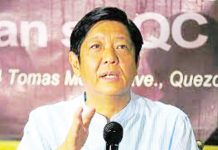ILOILO City – Effective Jan. 9, the Police Regional Office6 (PRO-6) will conduct checkpoints to enforce the Commission on Elections (Comelec) gun ban in line with the start of the election period on the same day, too.
Comelec Resolution No. 10741 set the checkpoint guidelines, according to PRO-6 spokesperson, Police Lieutenant Colonel Arnel Solis.
There shall be at least one Comelec checkpoint in each city or municipality.
Additional checkpoints of the Philippine National Police (PNP) or Armed Forces of the Philippines (AFP) may be established in coordination with the Election Officer (EO) having jurisdiction over the city or municipality.
Any unit designated to man a Comelec checkpoint must be led by a regular member of the AFP or the PNP with a rank of at least Lieutenant or Police Lieutenant.
In the absence of these ranks, the highest ranking officer shall make a special designation of a lower ranking officer or non-commissioned officer to act as a commanding officer or team leader of the checkpoint.
An adequate number, according to the Comelec, of AFP and PNP personnel shall man checkpoints and must be in complete service uniform with the name plates and other identification tags clearly visible and readabl. They shall not be under the influence of alcohol or illegal drugs.
Checkpoints must be well-lighted and properly identified so that those who will pass through them could easily identify the AFP/PNP uniformed personnel manning the checkpoints with their nameplates and other identification tags clearly visible and readable.
Upon approach to any Comelec checkpoint, the team manning it must require the motorists to slow down, as well as courteously request to dim the vehicle headlights and turn on cabin lights.
In a checkpoint inquiry, the occupants cannot be compelled to step out of the vehicle, it added.
Comelec said “only visual search is required” – the officer simply looks into the vehicle and flashes a light without opening the car doors.
It added that no person may be subjected to physical or body search without any reasonable ground to believe that he or she has just committed, is about to commit, or is committing a crime.
“The public is not obliged to open the glove compartment, trunk or bags. The personnel manning the checkpoint cannot compel the motorists to open the trunk or glove compartment of the vehicle or any package contained,” Comelec added./PN





